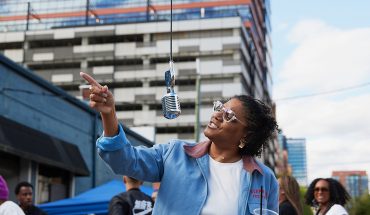by Andrew Kenney
photographs by Nick Pironio
Patrick Torres watches from the front of the hall as people take the stage one by one.
He hears them lay bare their own true stories: The woman who found a moment of relief with her dying mother; the veteran who realized perhaps too late that he only wanted home; a Northerner and his bitterly funny heritage. Each one looks so small and human up there.
Torres, a former youth theater educator from West Texas, wonders exactly what he’ll say when it’s his turn in the purplish lights. He has worried for days, and old shameful feelings have emerged along with the details of the story he plans to tell. It’s one he’s turned over in his mind repeatedly as he and his wife, Niki, drove their silver pick-up truck across the country to the campus of Raleigh Little Theatre.
Torres is the theatre’s new artistic director. He has come far to take the role as fresh captain of one of the city’s oldest arts institutions, which sits tucked away in the tree-canopied neighborhoods west of downtown. In this August performance of The Monti, a Durham- and Chapel Hill-based show built around the factual stories of everyday people, Torres will share his own story the philosophy he brings to the stage where he’ll replace the late, venerable Haskell Fitz-Simons.
Torres has made a career of stories, but they’ve all been other people’s.
Here, in the city where he’s lived for only a month, at the theater where his predecessor’s legacy is beloved and inescapable, Patrick Torres is going to introduce himself – for what feels like the first time.
Something important to say
Torres takes long paces across the stage and settles at its center. With his hands in his pockets and dark-striped shirt tucked into darker pants, spotlights cast two big shadows behind him.
It’s been 20 years since Torres’s West Texas days, and now he asks himself what a whole new audience will think of the contrasting, inseparable cultural tropes hung on his broad, tall frame. He’s a Latino man who doesn’t speak Spanish, an athlete who quit football for the theater, a storyteller who guards his own story tightly.
His first words knock the room off balance: “Who has something important to say?” he asks. The people in the seats, of course, expect the man at the microphone to do the talking – and this trick is one of Torres’ favorites. He has asked the same question all through the years of the career that brought him here tonight.
Usually, his audience has been young. Often they have been marginalized, by poverty or sexual identity, or incarceration. And they, like the crowd tonight, do not eagerly answer the question. Torres waits for a moment, like a patient teacher before a classroom, before he explains himself. First, he tells the crowd about the answers he’s heard from those former students of his – like the woman who told him how she walked with from San Salvador to Washington D.C. with her baby brother.
In the career Torres has just left in Austin, he explains, he tried to draw these narratives and performances from kids across society.
His favorite stories, he says, were the shortest. They came from the students who wanted nothing to do with him, who sulked in the back. And when those most stubborn of students eventually “moved an inch,” by telling part of their stories, Torres loved them for it.
He tells the audience now about the kid who came to understand his own incarceration through drama’s metaphor, and another young man who simply acknowledged at the course’s end that his family loved him.
Describing them, Torres’ hands have swung out of his pockets and his posture has unfurled to its fullest. For a few minutes, it seems as if he will settle into the telling of one of those students’ stories.
But then the teacher draws up short, pausing a second, his attention shifting from past to present. He has never, he admits, told an audience about the fears and trials that defined his own formative chapters.
He has never stood up with “something important to say,” even as he tried to convince his students to “move an inch.”
“I started to realize,” Torres tells the auditorium, “that I’d asked them to be way more courageous than I’d ever been.”
He pauses and prepares himself.
“This is me moving an inch, telling you my story. And I’ve never done it before.”
Arts group’s storied history
In making this introduction, Torres is telling the group why he’s worthy of the lynchpin role he’s taken on in Raleigh’s performing arts scene.
Raleigh Little Theatre “is one of the oldest arts groups in town, and I think that has given it a special place in the community, even as the arts have grown tremendously,” says Eleanor Oakley, leader of the United Arts Council of Raleigh and Wake County, and managing director of RLT for most of the 1990s.
Haskell Fitz-Simons, last man in the director’s chair, was artistic director for three decades of Raleigh Little Theatre’s 80-year history. The gregarious son of a theater family, Fitz-Simons had a gentle way of guiding newcomers and amateurs into theater – and training them to his exacting standards, always outperforming the venue’s “little” billing.
Fitz-Simons kept his years of illness from many of his actors and stagehands, showing it only in hints, like the loss of breath that muted him in the beloved caroling group he founded.
His death at 64 came suddenly for most, after the director was hospitalized in the middle of a production.
In its mourning, the theater brought on a series of guest directors to finish the ambitious season Fitz-Simons had planned. His spirit seemed to echo through the rabbit warren of backstage halls and rooms.
“You know, he was such a force. He was a big man – he had a big laugh,” says Dee Penven-Crew, a friend who worked with Fitz-Simons for a decade at the theater.
“It’s hard to walk in there and not hear that laugh somewhere in the building.”
The search for a new director didn’t begin until late last year, still under the shadow of the older man’s career.
“You have someone who’s been very well respected, so well-loved in that role in the theater for that long – heaven help the person who tries to come next,” said Shelley Crisp, the nonprofit’s vice president.
The committee was looking for “an educator, a leader and a great communicator, a mentor,” said Charles Phaneuf, Raleigh Little Theatre’s executive director, reflecting the mission of a group that prides itself on making art without professionals.
The theater’s leadership took about 60 applications for the job, then homed in through rounds of interviews on Torres, who had applied on something of a whim.
Toward the end of the search, the selection panel wanted to see productions by the finalists – but Torres didn’t have one to show just then.
Instead, on short notice, he convened a small crew of friends to perform Nerve, a dark comedy by Adam Szymokowicz, on the fourth floor of a Baptist church in Austin.
They had little time to prepare, but it was a success.
“I was overwhelmed by the loyalty that that demonstrated …” Crisp said. “They had the whole thing (memorized) almost completely off book.”
That performance, and the applicant’s decade in education, cemented the theatre’s decision and set Torres on his life-inverting summer, from the birth of his second daughter to a cross-country move – and, at last, to the telling of his story.
His story
Patrick Torres grew up in the town of Odessa, Tex., best known as the set of the football drama Friday Night Lights.
He was son of a white woman and a man of Mexican descent, born with his mother’s face and his father’s skin.
On stage, the new director unseals his story cautiously.
“In West Texas, when you grow up that close to the Mexican border, this skin tone raises expectations,” he tells the crowd. People expected, he said, that anyone with skin like his would speak Spanish, and be Latino through and through.
But Torres’ parents wanted him to become the family’s first college graduate, and they thought he should focus on English first. They never spoke Spanish in the house. So he grew up, in others’ eyes, as a boy with one group’s appearance and another’s language.
And people didn’t just expect him to speak Spanish – they spoke Spanish to him. Often enough, when he couldn’t reply, he faced angry accusations.
“You don’t identify with your culture,” they’d say. “You want to be a coconut” – white on the inside, brown on the outside.
“All of this started to have an effect on me,” he tells the Raleigh audience, big eyes widening. “It made me want to retreat … There was something that I lacked. There was a gap for me.”
Eventually, he says, he found an answer in theater, where he’d been watching his older brother act. The first time he saw a performance was the first time he felt a real camaraderie with a room full of people, he recalls.
“Everybody was experiencing something real together.”
That sank in, and by his junior year of Odessa High School, he was ready to commit the town’s “cardinal sin”: quitting football, just as he was ready to join the varsity team, so that he could join the theatre.
He’d found a way, using scripts, these stories by other people, to bridge his gap and connect with other people.
“It’s relevant to them, it compels them, it makes them want to talk about it,” he says of theater. “It is at its heart civic dialogue.”
And in graduate school, reading Augusto Boal’s Theatre of the Oppressed, Torres would realize that it wasn’t just playwrights that could share these stories, but everyday people too.
In the first decade of his career, he developed an award-winning curriculum for young playwrights in Washington D.C., taught Shakespeare in the city’s heart and, in Austin, helped incarcerated and LGBT youth create and perform works of arts.
He won a reputation over that decade – not unlike Haskell Fitz-Simons had – as a man who found people’s best.
It was over those years that he developed the philosophy of inclusion and expression that he’ll bring to Raleigh Little Theatre, where he hopes both to develop new talent and to include a more diverse set of playwrights’ work.
In his new job, in the public life he’s beginning with this story, his ideas and his methods will come into action on a new scale. His employers are confident that Torres’ plans will match Raleigh Little Theatre’s, and that they’ll evolve together.
In fact, he’ll find a precedent for his work.
“Raleigh Little Theatre’s always been somewhat adventurous, given the times,” Eleanor Oakley says. “Every community theater has to be aware of the values and morals in their community – but at the same time, I think a really good community theater balances that with an attempt to be a little ahead of the curve in terms of social issues.”
But, before all that can begin, Torres wants to move another inch:
“Mi nombre es Patrick Torres, y tengo algo importante que decir,” he says with a convincing accent. “My name is Patrick Torres, and I have something important to say.”
Raleigh Little Theatre, 2014-2015
November
Mirandy and Brother Wind, Oct. 31-Nov. 16
December
Cinderella, Dec. 5-20
January
Venus In Fur, Jan. 16-Feb. 1
February
Much Ado About Nothing, Feb. 13-March 1
March
The Velveteen Rabbit, March 6-22
April
Sleeping Beauty, April 3-12
May
Bloody Bloody Andrew Jackson, May 1-17
June
Macbeth, June 19-27
wwwraleighlittletheatre.org






